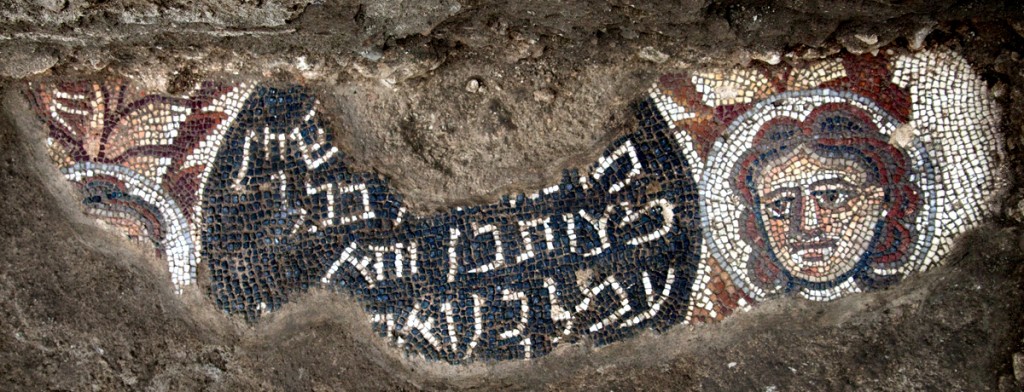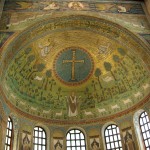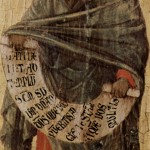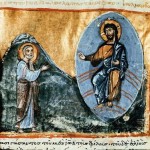
What It’s About: This is Jeremiah’s call story, where God comes to him and appoints him as a prophet. As is somewhat traditional when someone is called by God in the Hebrew Bible, Jeremiah protests his unworthiness. People like Moses protest their lack of skills, and people like Jonah protest their lack of interest. And just like Moses and Jonah, Jeremiah’s objections are steamrolled by an insistent deity, who sends the prophet out no matter what faults he may feel he has.
What It’s Really About: This is about establishing the source of divine oracles. The prophets, this passage is suggesting, do not speak for themselves. They speak for God. That’s why Jeremiah’s own inadequacies don’t matter much; God is actually putting words in Jeremiah’s mouth, according to verse 9. Jeremiah’s prophecy, then, takes on the character of divine utterance. I’ve wondered recently, based on conversations with students and colleagues at the Iliff School of Theology, whether prophets in the Hebrew Bible function kind of like human extispicy. Extispicy is that category of divination that relies on things like the examination of entrails and the flight of birds to discern divine will. Prophets sometimes act like that: as unwilling and inert vessels that somehow contain divine communication. Their own will, skills, personality, or knowledge doesn’t matter much. That’s a bit of mental gymnastics, but I think it helps to make sense of this dynamic of human protest and divine overrule.
What It’s Not About: The most famous thing about this passage is verse 5, which is often cited as an anti-abortion text, or at least one that establishes personhood before birth. I think that’s a fine re-appropriation of the verse, and as exegesis it’s not bad, but it really doesn’t have much to do with the context of the verse as it’s found in the book of Jeremiah. In Jeremiah the verse functions as a kind of reassurance of purpose, but also as a kind of rank-pulling of God over Jeremiah. It’s not meant as a scientific or even ethical statement, but simply as a way of saying “don’t sweat it, I know what I’m doing here.”
Maybe You Should Think About: This verse is in some ways opposed to modern practices of discernment. Discernment is often presented as a pure good in Christian discourse; we are told to discern purpose and direction and meaning and all manner of things. But this story, along with ones like the call of Moses and the sending of Jonah to Nineveh, don’t leave much room for discernment. Both models are fine, I think, but it’s worth thinking about the fact that they are in contrast to each other. How much are we in control of our spiritual paths, and how much are they determined for us? That’s an old debate, but one that never gets old.
What It’s About: This is the “love chapter,” Paul’s famous discourse on the place of love in the community. It comes near the end of his letter, most of which he has spent arguing against what he sees as examples of bad or unfaithful behavior at Corinth. This is one of Paul’s most intensely pastoral moments, as he turns all of his anger and indignation from the first chapters, and his thoughts on good community from chapters 11 and 12, into this poetic and forceful meditation on love as a binding force for Christian community.
What It’s Really About: The word Paul uses throughout is the Greek agape, which was one of early Christianity’s favorite theological terms. It shows up in John 21 as Jesus talks to Peter by the water. It shows up as the name of the communal meal of early Christian communities. And it shows up here, as a defining ethos of the faith. There were other words for “love” that Paul might have chosen, but he didn’t choose them; he chose agape as an encapsulation of all that he wanted to say. This is really about Paul’s heartfelt exhortation to people he loved, but people who had disappointed him. This chapter is Paul saying, “I want you to be better.”
What It’s Not About: Don’t have this read at your wedding. (Well, unless you’re interested in using your wedding to endorse Paul’s views of Christian community). It’s not about romantic love. At all.
Maybe You Should Think About: In this passage, Paul presents the Christian journey as a kind of growing up. Childhood and childish things give way to things that are better, truer, and more holy. (This is a profoundly Platonic passage, for all you philosophy buffs). It’s a rough match, but in some ways Paul is describing what modern churches often call “discipleship.” Paul does not think that you get baptized and suddenly everything is better, and you’re immediately holy. Paul thinks Christian life is a journey, and we know things later that we didn’t know earlier. That’s how our lives go, and that’s how the life of Christian community goes. It’s a comforting sentiment; we don’t have to get it right, right away, and we can grow by failing. That’s his message to the Corinthians with all their grotesque and baffling failures, and that’s his message to anyone seeking to live a Christian life.
What It’s About: This follows on from last week’s story of Jesus reading the Isaiah scroll in the synagogue. This is the aftermath of that…the part they might not put in the highlight film. Last week’s text had Jesus reading Isaiah as a kind of mission statement for himself: release to the captives, recovery of sight to the blind, and all that good stuff. This week, though, is about the awkward silence that followed the reading of that mission statement, and then, slowly, the grumbling that built up in the room. “Wait, isn’t that Joseph’s kid?” Not even Jesus can escape the gravity of his past, and there in his hometown, nobody can get past the fact that they knew him when he was a middle schooler. It’s a perverse kind of prejudice, because their skepticism, in turn, erodes Jesus’ power. They chased him out of town. Literally.
What It’s Really About: This is a really interesting insight into Jesus’ identity. We don’t get a lot about him–as a person–in the gospels. We hear about him being born, and the one incident in the temple when he was a tween, but after that there’s silence until he is baptized. That gap is filled in, in a small and incomplete way, through this glimpse into hometown life. Not everyone is head over heels for Jesus; his own friends and neighbors know enough about him to be skeptical. What did they know? Of what illness did they expect the “doctor” to cure himself?
What It’s Not About: It’s hard to imagine this story being told this way in the gospel of John. This is a very synoptic Jesus: vulnerable, human, and rejected. Jesus actually handles it really well; he holds his own in the back-and-forth at the synagogue, and he escapes at the end of the story without much damage. But it’s a very important story in the building up of Jesus’ identity in Luke, and it points to a Jesus who struggles and strives, not one who strides onto the scene as a divine force, like in John.
Maybe You Should Think About: That line about prophets and their hometowns has been quoted many, many times. Why is that? Does familiarity breed contempt? Or are we weakened by reminders of our beginnings? Either way, maybe this has something to say to churches. Do we need to leave our “hometowns” to know who we are? To do effective work? Is there something about striking out to new places that tells us about ourselves?












